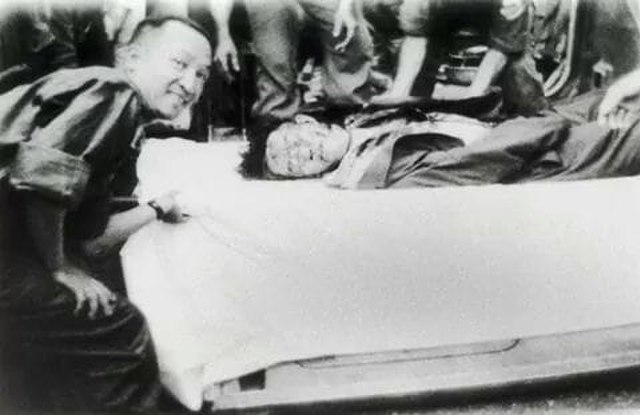This summer and fall mark the 60th Anniversary of crucial events in the Vietnam War (also known as the Second Indochina War). After taking a graduate class on the conflict this summer, I want to share some reflections as crucial anniversaries arrive.
On August 24, 1963, President Kennedy authorized a secret cable for U.S. Ambassador in South Vietnam, Henry Cabot Lodge, Jr. Days earlier a Buddhist monk had immolated himself in protest to South Vietnamese president Ngo Dinh Diem’s regime and Diem, inexplicably from the American standpoint, had doubled down and ordered his Special Forces to raid Buddhist pagodas to imprison and silence Buddhist dissidents. In this cable, Kennedy and his aides told Lodge to coerce South Vietnam’s president Ngo Dinh Diem to accede to a litany of U.S. demands in the wake of his botched handling of Buddhist protests: “Fix this now” was the message. If Diem didn’t cave, Lodge was to surreptitiously approach South Vietnamese generals and plan a coup. While many debates between August 1963 and November 1963 halted or restarted plans for a coup against Diem, this cable in August started conversations which ended with the U.S. tacitly signaling South Vietnamese generals to remove Diem, an ally the U.S. had backed unquestioningly since 1955, from power.
The coup against Diem demarcates a crucial turning point in the Vietnam War. Historians agree that the power vacuum created by Diem’s assassination put pressure on the U.S. to assume more responsibility for training, planning, and organizing military responses to a Communist-backed rural insurgency that the U.S. saw as the real threat to Diem’s power before his assassination. In a little over a year-and-a-half after Diem’s murder, President Johnson would send combat troops to Vietnam.
Historians and pundits have asked if things could have turned out differently in Vietnam if the U.S. had pursued another course. Some argue that the U.S. decision to back a coup against Diem was that crucial point when the whole project lost its viability. These historians argue that if the U.S. had stuck with Diem, pressured him to reform his government and curb its repression, and win over South Vietnamese peasants, there could have been a different outcome.
Others point to 1954, when Diem first came to power, as the moment when the U.S. could have done more to emphasize nation-building over military training. Still others offer Spring 1968 after the Tet Offensive. If the U.S. and South Vietnamese had capitalized on their military victory here, so the argument goes, they could have driven Communist insurgents and regular North Vietnamese military troops from the nation altogether. Others even claim that General Creighton Abrams had won the whole thing with his pacification program between 1968 and 1970 and that the U.S. decision to withdraw after military victory had been achieved gave up the game when it was already won.
For all these counterfactuals, the Vietnam War was essentially unwinnable based on the assumptions that the U.S. brought into the conflict. The Vietnam War was a war for national liberation and unification fought by ardent Vietnamese nationalists who adopted Communism as a tool to militarily and economically organize their people to defeat the French and then the United States. Vietnamese people saw Communist Ho Chi Minh’s Viet Minh (and later Vietnamese Workers’ Party) as the most legitimate governing institution for Vietnam. They believed this not because he was a Communist, but because his nationalist credentials — defeating the Japanese and then defeating the French — made him the ardent anti-imperialist Vietnamese people wanted. Positing that the U.S. could have won the war had it altered certain decisions ignores the flawed way U.S. policymakers understood the conflict. Six successive presidents all embraced the central U.S. idea that this conflict was critical to halting the spread of Communism. They saw the conflict in military terms (defeat Communist insurgents and North Vietnamese armies), not as a question of politics (who has the legitimacy to rule Vietnam?). These ideological assumptions informed U.S. policy and presidents across successive administrations never really questioned them. They conflated winning a civil war in Vietnam with defending West Germany from Soviet invasion. Arguing the U.S. could have won the Vietnam War is akin to saying the British could have prevented the American Revolution if they just gave actual representation to Anglo-American colonists in Parliament. That isn’t necessarily a wrong statement, but it is not easy to believe in the context of how Britain sought to govern and how Anglo-American colonists conceived of themselves either.
Stay tuned for future installments in this series where I discuss why some historians and pundits argue for a winnable war, insights into the conflict from North Vietnam’s perspective, and my own thoughts on the parallels between the Vietnam War and 21st century American foreign policy.
Further reading:
Max Boot’s The Road Not Taken: Edward Landsdale and the American Tragedy in Vietnam
Fredrick Logeval’s Embers of War: The Fall of an Empire and the Making of America’s Vietnam
George C. Herring’s America’s Longest War: The United States and Vietnam, 1950 to 1975
Edward Miller’s Misalliance: Ngo Dinh Diem, the United States, and the Fate of South Vietnam
